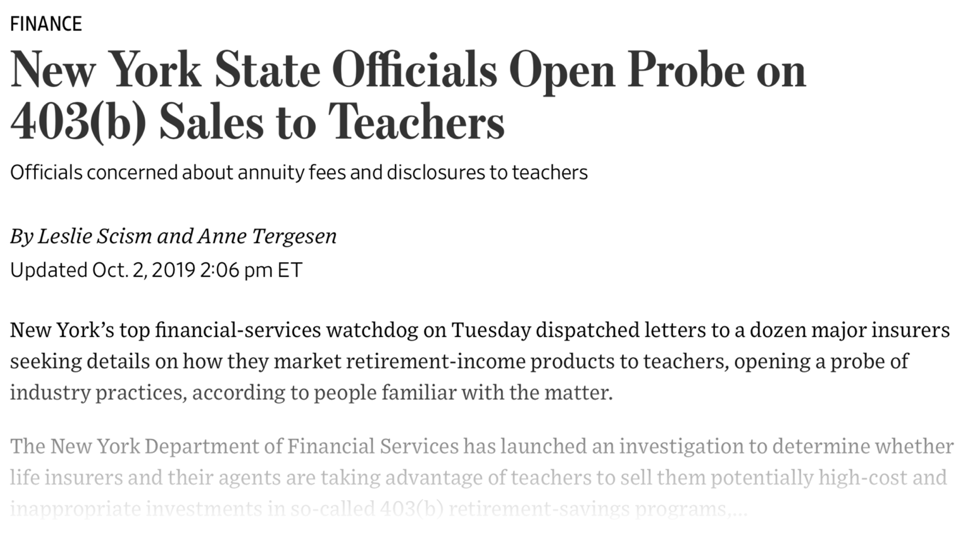Over the past few months, we have seen several news stories that raised concerns about insurance companies and their retirement plan sales practices. For example, here is an article that was published in late 2019 by The Wall Street Journal:

Based on the investigations that have reportedly been launched by the New York Department of Financial Services, as well as the Securities and Exchange Commission (SEC), how should retirement plan sponsors respond?
We review a few steps plan sponsors can and should take to properly conduct their own independent due diligence on their plan’s insurance companies (or vendors).
Completing a Formal Inquiry with your Plan’s Insurance Companies or Vendors
When your vendor(s) and/or their competitors are being formally investigated, we believe it is prudent to identify if and how the potential areas of concern could negatively affect your plan and your participants. We recommend compiling a list of your concerns and questions for your vendors, and requesting a response in writing.
The responses you receive from your vendor(s), will likely determine your next steps. At a minimum, if there are remaining concerns or a formal review process has not been recently completed, you will want to consider the following:
Surveying Your Plan Participants
Conducting a participant survey can help you identify potential areas of weakness with your current vendor(s).
We recommend automated surveys that your participants can complete within five minutes. Areas of focus should include satisfaction levels with in-person, telephone and on-line services, as well as investment offerings. Recognize that many participants are not familiar with the fees they are paying, so receiving feedback about fees could prove to be either challenging or misleading.
Reviewing Your Plan Services and Fees
Our experience has been that many vendors do not offer fee reductions to their long-term clients, even as they are offering better pricing to their new clients.
If you have not reviewed your plan services and fees within the past 3 years, we would strongly encourage you to complete a formal benchmarking process. At a minimum, each vendor’s participant services and investment offerings should be assessed relative to peer offerings. “Apples-to-apples” fee comparisons should be conducted where possible, recognizing there will be differences in what each vendor offers.
Conducting a Vendor Search
Service offerings are constantly changing, and yesterday’s service leaders may now be lagging their competition.
If it has been over 5 years since you last assessed your vendor(s), or if you cannot recall how long it has been, you should consider conducting a formal vendor search. Furthermore, if you have experienced persistent service concerns, we would strongly encourage you to take your retirement plan out for bid.
Also, most plans charge fees as a percent of assets. Over time, plan growth and market competition should lead to reductions in your plan’s average fee percentage. Left unchecked, your vendor(s) fees will grow at a rate that greatly exceeds the growth rate of services being delivered to the plan. In short, if fees are not negotiated on a regular basis, then your participants will pay above market fees while your vendors reap the windfall.
Conclusion
Our parting thought – your participants can provide meaningful feedback about vendors’ services, but they are unlikely to know whether the fees they are paying are competitive. Plan sponsors should regularly assess and negotiate plan fees, doing so on a regular basis to ensure their participants are not paying more than they should for their investments and the services they are receiving.
PlanPILOT is an independent retirement plan consulting firm. We assist retirement plan sponsors with assessing their plan fees and services, and we have negotiated significant fee savings and service enhancements for our clients. We welcome the opportunity to begin a conversation with you. Contact us at (312) 973-4911 or info@planpilot.com.
Related Posts
 Why Plan Sponsors Should Hire a Retirement Plan Consultant - Learn why plan sponsors choose to work with a retirement plan consultant, as well as a few of the questions you'll want to ask if… ...Read More
Why Plan Sponsors Should Hire a Retirement Plan Consultant - Learn why plan sponsors choose to work with a retirement plan consultant, as well as a few of the questions you'll want to ask if… ...Read More Evaluating Your Plan’s Recordkeeper - Learn more about the role a plan recordkeeper plays and some of the factors plan sponsors should consider when choosing and evaluating a recordkeeper. ...Read More
Evaluating Your Plan’s Recordkeeper - Learn more about the role a plan recordkeeper plays and some of the factors plan sponsors should consider when choosing and evaluating a recordkeeper. ...Read More Benefits of an OCIO Search Consultant - There are many reasons it can make sense to outsource your chief investment officer (CIO) functions and duties, but finding the right OCIO manager is… ...Read More
Benefits of an OCIO Search Consultant - There are many reasons it can make sense to outsource your chief investment officer (CIO) functions and duties, but finding the right OCIO manager is… ...Read More
